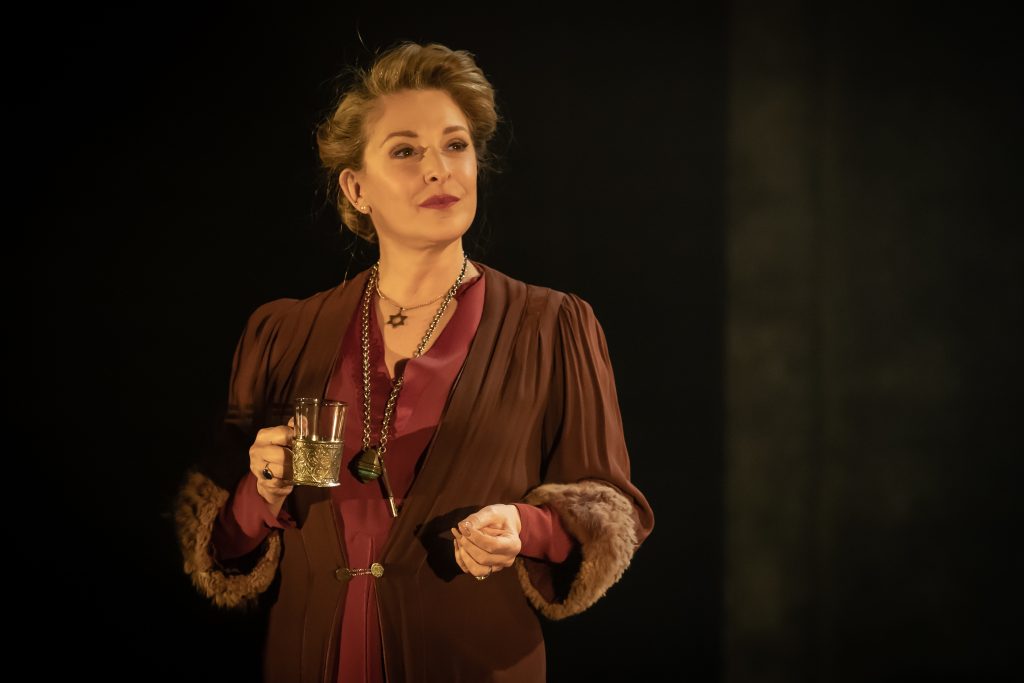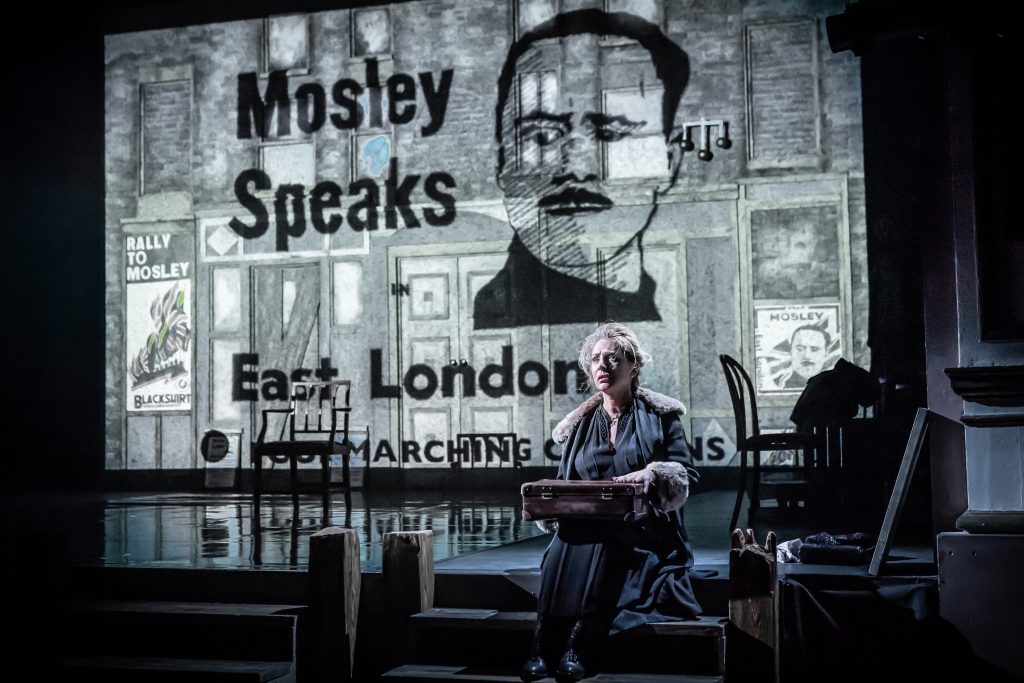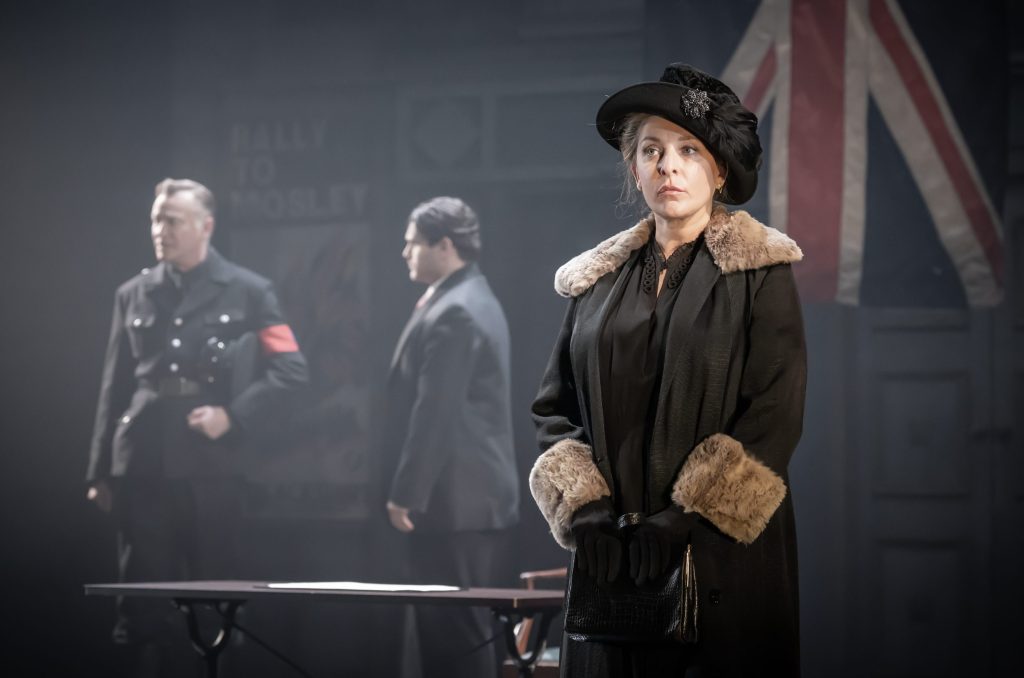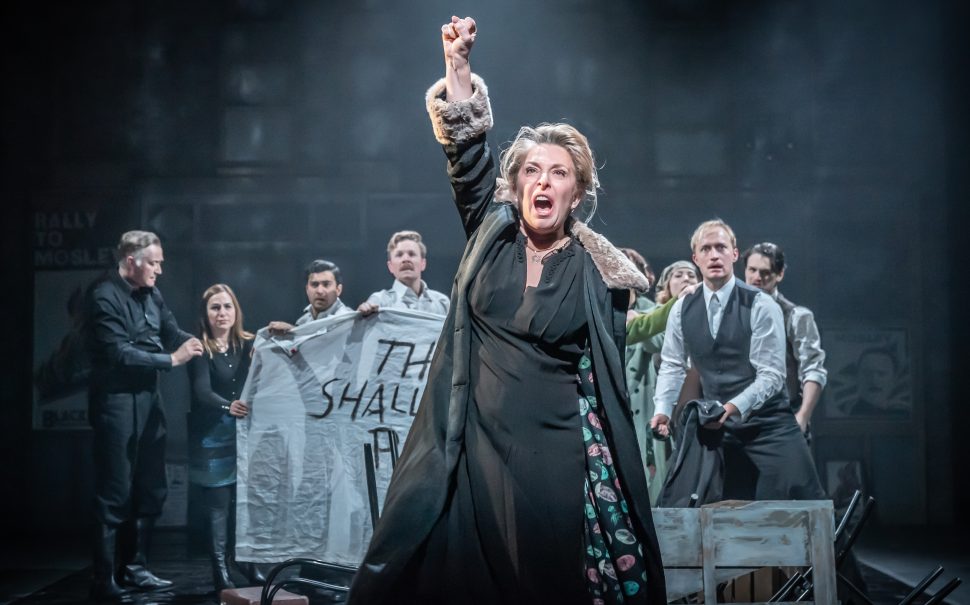Director Brigid Larmour brings a fresh urgency to The Merchant of Venice in this production by Watford Palace Theatre at HOME Manchester.
Larmour relocates Shakespeare’s tale of vengeance and oppression from 1500s Italy to 1930s London amidst a backdrop of rising tensions between Jewish communities in the East End and the British Union of Fascists.
The production returns to HOME after a successful run in the 2022/23 season and thoroughly deserves its acclaim.
Shakespeare’s play follows Jewish moneylender Shylock as he strikes a bargain with merchant Antonio: a loan of three thousand ducats for the latter’s friend Bassanio – charming, but terrible with money – to woo the heiress Portia. A pound of Antonio’s flesh is agreed as the insurance on the loan.
The new setting is a huge success, giving the production a feeling of immediacy and desperation that feels both grounded in its time period and connected to modern-day concerns over the rising far right and antisemitism.
Another compelling decision is to gender-swap Shylock. The openly antisemitic scorn poured on her and thinly veiled threats of violence have a gendered note to them, cleverly showcasing the intersection between different forms of oppression.

Tracy-Ann Oberman is a powerful central figure as Shylock, the play’s bitter matriarch, driven by grief for her runaway daughter and revenge against her oppressors. Former EastEnders star Oberman brings steel to her portrayal of the hard-nosed businesswoman and isn’t afraid of making Shylock unlikeable.
Her enemies in this production are the English establishment. Antonio (Raymond Coulthard), clearly based on smooth-talking Sir Oswald Mosley, carries himself with the sneering swagger of a man used to running the show.
Bassanio (Gavin Fowler) is a puppyish, more sympathetic character whose descent into radicalism is made all the more disturbing by his joviality in the play’s earlier moments. Upper-class thug Gratiano (Xavier Starr) provides a physical menace to the play, wielding a Union Jack, urinating on Shylocks’ house and drunkenly threatening the Jewish community.
Portia (Hannah Morrish) is particularly impressive as an icily contemptuous but charming socialite, smug and malicious in her courtroom victory. There are moments of humour, although thin on the ground, in the form of her pompous failed suitors and wry asides at their expense.
The Bullingdon Club-style banter between the aristocratic men is effective, as is Bassanio’s genuine grief at the prospect of losing a dear friend. Less well developed is the relationship between Jessica (played as a giddy schoolgirl by Grainne Dromgoole) and mother Shylock. The motivation behind her decision to betray her mother and her upbringing is never fleshed out, so it feels like a significant element of her character is missing. Onstage she feels like an accessory, first to Shylock, and then to husband Lorenzo.

Collusion between the fascists, authorities, and the police makes Shylock’s isolated position even more dangerous and calls to mind contemporary issues over the policing of marginalised communities. The courtroom scene sees the Duke call Shylock ‘Jew’ and pits Shylock on her own against a room full of fascists.
A row of seating on either side of the stage involves some audience members in the action, making us complicit in the court judgement and bystanders watching on as Shylock’s life is dismantled.
Liz Cooke’s set very effectively juxtaposes the genteel world of candlelit gentlemen’s clubs against Shylock’s home in a working-class area of East London, which gets daubed in antisemitic graffiti and fascist posters as the action continues.
A haunting, elegant piano soundtrack – composed by Erran Baron Cohen – is broken up by occasional sounds of smashed glass and shouting as the two worlds collide. Even the costumes contribute to the play’s claustrophobic feel as the net closes in around Shylock: white tie and tails give way to jackbooted uniforms and BUF armbands.

The production is powerful and expansive, but is too heavy-handed on some aspects. The flashing projections of BUF marches along the back wall and the soundtrack of Mosley’s speeches feel a little overdone, and the final dramatic stand for justice seems tacked-on after the action properly concludes.
In other ways interesting comments on gender and class are a little undercooked. Gratiano’s violent streak shadows his quarrel with wife Nerissa over the missing ring, and Portia and Nerissa are disdainful towards Jessica not only because she is Jewish, but seemingly also for her class and presentation – she appears in a short, modern flapper dress while they wear full-length silks. The play tackles many issues effectively, but it feels like there’s room for more.
Overall, though, this is a powerfully acted and cleverly executed production, bringing a new perspective to a timeless classic.
Image credits: Marc Brenner. Used with permission of HOME Manchester.




